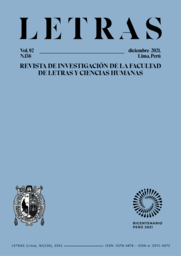Ruling Despite Consciences. Roger Williams on the Border Between Augustinianism and Liberalism
Abstract
Roger Williams (1604-1683) is considered one of the main authors who paved the way for the basic ideas of modern political life, such as freedom of conscience, tolerance, and neutrality of the State in religious matters. Several of them are reflected in his famous work The Bloudy Tenent of Persecution for Cause of Conscience (1644). However, what is distinctive about Williams is not only his modernity, but also that he elaborated these ideas from the breadth of biblical tradition as well as Christian thought. Therefore, this essay seeks to turn to the Christian dimension of Williams and to show how it has continuity with the political thought of Saint Augustine of Hippo regarding order and peace in the city. This will be done through a comparison of both thinkers in key subjects. To do this, I will define the contours of the religious tolerance proposed by Williams in relation to the problem of freedom of conscience in The Bloudy Tenent,comparing this with some general features of Augustinian thought contained in The City of God. Finally, this notion of tolerance will be contrasted with propositions of liberal origin, specifically taking John Locke's Letter on Tolerance as an example. Through this it will be possible to see the differences between a Christian position and a liberal one.Downloads
Métricas alternativas
References
Agustín de Hipona. (2009). La ciudad de Dios. Madrid: BAC
Álvarez, S. (1960). Hacia la determinación de la idea agustiniana de paz. En Revista de estudios políticos, Nº 112, pp. 49-90.
Bejan, T. (2017). Mere Civility. Londres: Harvard University Press.
Bejczy, I. (1997). Tolerantia. A Medieval Concept. En Journal of the History of Ideas, vol. 58, N° 3, pp. 365-384.
Blázquez, D. (2004). Introducción. En El sangriento dogma de la persecución por causa de conciencia. Madrid: Centro de Estudios Políticos y Constitucionales. Pp. XXI-XLV.
Gray, J. (2000). Pluralismo de valores y tolerancia liberal. En Centro de Estudios Públicos, N° 80, 77-93.
Kaufman, P. (1990). Redeeming Politics. New Yersey: Princeton University Press.
Little, D. (2016). Constitutional Protection of the Freedom of Conscience in Colonial America: The Rhode Island and Pennsylvania Experiments. En Christianity and Freedom. Eds. Timothy Samuel Shah y Allen D. Hertzke. Cambridge: Cambridge University Press. Pp. 235-263.
Locke, J. (2018). Carta sobre la tolerancia. Madrid: Tecnos.
Mansuy, D., y Svensson, M. (2013). Tolerance. En The Oxford Guide to the Historical Reception of Augustine. Eds. Karla Pollman y Willemien Otten. Oxford: Oxford University Press. Pp. 1815-1818.
Naciones Unidas (s/f). La Declaración Universal de Derechos Humanos. Nueva York, EEUU: United Nations. https://www.un.org/es/universal-declaration-human-rights/
Nussbaum, M. (2012). The New Religious Intolerance. Londres: The Belknap Press.
Rist, J. (2016). Augustine and Religious Freedom. En Christianity and Freedom. Eds. Timothy Samuel Shah y Allen D. Hertzke. Cambridge: Cambridge University Press. Pp. 103-122.
Svensson, M. (2011) Conciencia moral y libertad de conciencia en Locke. En Ideas y valores, vol. LX, N° 146, pp. 141-164.
Williams, R. (2004). El sangriento dogma de la persecución por causa de conciencia. Madrid: Centro de Estudios Políticos y Constitucionales.
Copyright (c) 2021 Letras (Lima)

This work is licensed under a Creative Commons Attribution 4.0 International License.
Este obra está bajo una licencia de Creative Commons Reconocimiento 4.0 Internacional



















